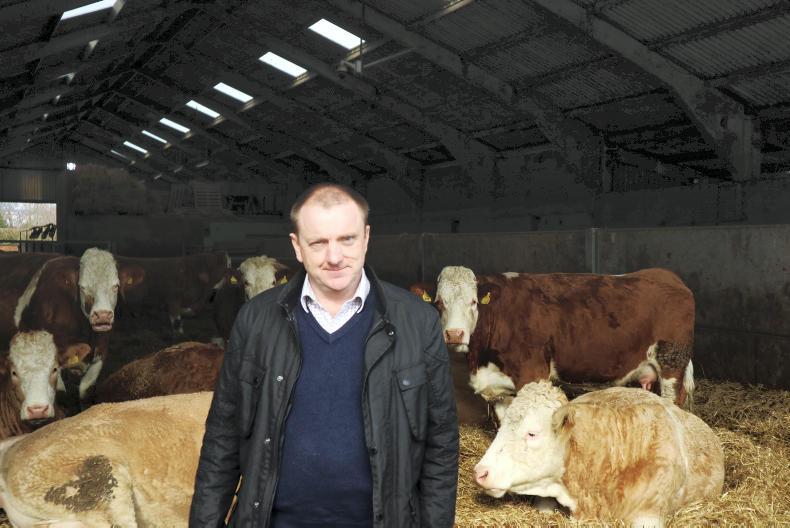Having been in the position of chair for Quality Meat Scotland (QMS) since 2011, Jim McLaren will stand down from his post later this year. Prior to taking up the role, Jim was also the NFU Scotland president for four years. He continues to run a mixed arable and livestock farm in Perthshire, with the main focus on producing malting barley and managing a Simmental herd.
Jim writes of his experiences as QMS chair below.
Life at QMS
It has been an honour to serve as chair of Quality Meat Scotland over the past seven years. I will step down in September 2018 to allow my successor to be fully in harness before Brexit day.
Despite being an organisation committed to the success of Scotland’s red meat sector, QMS is really about people. Among them are the farmers, processors, mart operators, butchers, hauliers and feed companies who make up the front end of our industry. There are also those who work in the secondary processors, wholesalers, retailers and the food service sector, along with individual consumers, whose support is vital.
QMS is a small organisation which packs a huge punch and it has been a privilege to work with all the staff, past and present, on the delivery of an eye-watering amount of work. It was my particular privilege to work with Uel Morton for six of his 11 highly-successful years as QMS CEO, prior to his retirement from the role in 2017.
Uel’s successor as CEO, Alan Clarke, has quickly found his feet, with his lack of red meat industry background allowing him to look afresh at our industry. Since his appointment in July 2017, Alan has engaged in a whirlwind of industry visits and engagements, while implementing an evolutionary change programme within the organisation itself.
An early success for Alan has been progress on an interim solution to the vexed question of red meat levies collected on animals in one country which were born, bred and finished in another. QMS, and our counterparts in Wales and England, has been working on this issue for many years, but in 2017 we agreed to the creation of a £2m ring fenced fund of levies collected annually by AHDB in England to be used for the equal benefit of all three nations.
I was also very fortunate to enjoy a great working relationship with our longest-serving Cabinet Secretary Richard Lochhead. Richard developed a great empathy with farmers and the red meat sector in particular, recognising its vital importance to the success of Scottish agriculture more widely, evidenced by his commissioning of the Beef 2020 report and the Scottish Sheep Sector Review.
Challenges facing the industry
Often in life it is adversity which brings out the best in people. I would like to highlight two such occasions which are worthy of note.
In early 2013 the horsemeat scandal dominated the media agenda. This scandal was created not through lack of regulation, but by criminals who exploited existing regulations. Unfortunately, the integrity of the vast majority of our industry can be undermined by an unscrupulous minority and to that end I firmly believe that we should be DNA-sampling every bovine in the abattoir to create a DNA database for future authentication purposes.
Another example of ‘adversity bringing out the best’ was the fire at Brechin abattoir in August 2017. This fire, and the subsequent closure of the Brechin plant for almost four months, saw the board of QMS, in conjunction with the Scottish SPCA, agreeing to give Tulip a tightly controlled derogation for the use of the Specially Selected Pork brand on Scottish pigs slaughtered in the Ashton plant while the Brechin plant was closed. This derogation allowed the brand to remain on retail shelves.
The fire also highlighted the fragility of some elements of the red meat supply chain in Scotland, with reliance being placed on a reducing number of ever larger plants. It is pleasing to see that the new abattoir at Inverurie is soon to be built.
In 2017, Scotland Food & Drink launched its Vision 2030 document, with an ambitious target to double the value of Scotland’s food and drink sector by 2030. This ambition has truly thrown down the gauntlet to the red meat sector, which is responsible for almost 40% of agricultural output when measured at ex-farm level.
For too long many farmers have felt remote from the success of the wider food and drink sector and seen themselves as part of the farming chain rather than part of the food chain. We must continue to increase farmers’ confidence that the high value markets for our produce can be enlarged, despite the Brexit challenges.
Looking to the future of QMS
My final comments relate to the board of QMS, whose members bring together such a diverse mix of skills, knowledge and experience. It has been a privilege to chair a board made up of such exceptional individuals and I wish them and their successors the very best for the future.
Several opportunities now exist to apply for membership of the QMS board, and a new chairperson is obviously required. Good luck to all.






 This is a subscriber-only article
This is a subscriber-only article










SHARING OPTIONS: